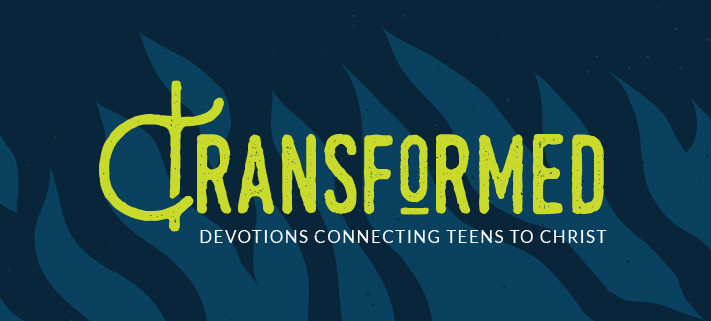Transformed – teen devotion – October 18, 2020
In the month of October, the Transformed devotions deal with “apologetics”, that is, a defense and explanation of Christian beliefs like trustworthiness of the Bible, who is God, and why faith is counter-cultural to the world.
In the past God spoke to our ancestors through the prophets at many times and in various ways, but in these last days he has spoken to us by his Son, whom he appointed heir of all things, and through whom also he made the universe.
Hebrews 1:1-2
God’s revelation
Is there evidence for the existence of God? Atheist British philosopher and mathematician, Bertrand Russell, argued that it is “unscientific” to conclude that a Creator caused the universe. But can science even say that? If science is the study of the natural world, how can science possibly prove there is nothing beyond the natural world? And where in nature have we ever observed something come into being from nothing? So, if the universe began to exist, it must have had a cause. And whatever caused the universe to come into existence must be something (or someone) beyond the need for space, time, and matter. It would have to be a timeless, infinite being with limitless power. That sounds an awful lot like God!
What is more, if our universe somehow were the accidental result of time + matter + energy + chance, how do we explain that our universe is finely tuned for the existence of life? Seriously, look it up! Did you know that there are universal constants that, if their numeric values were altered even to the slightest degree, no life of any kind anywhere could exist?
Let us take gravity, for example. In high school physics, you will solve problems where you will calculate the force of gravity, the equation for which is F = (G x m1 x m2)/r2. If you have never seen that equation before, then you probably have not made it to physics yet. Long story short, if the constant ‘G’ (the gravitational constant) changed by even the tiny figure of 1 in 1060 parts (that’s a 1 followed by sixty zeros), not a single one of us would be here. No life would exist anywhere.
To put that figure in perspective, your chances of winning the Mega Millions Jackpot lottery is 1 in 302,575,350. That ratio is 1 over a nine-digit number. Those are terribly improbable odds. Can you imagine how even more unlikely it is that by sheer chance our universe came into being by accident AND that the exact gravitational constant we observe that is needed to sustain any and all life in the universe is exactly as it is? The improbability of that figure would make winning the lottery look as easy as tying your shoes. Doesn’t it seem entirely more likely that a powerful Creator created our universe to be a certain, specific way… that a wise Designer designed the universe to facilitate life of all kinds?
And yet, there still are many who double down and insist that there is no God. Atheist biologist, Richard Dawkins, said,
“In a universe of electrons and selfish genes, blind physical forces and genetic replication, some people are going to get hurt, other people are going to get lucky, and you won’t find any rhyme or reason in it, nor any justice. The universe that we observe has precisely the properties we should expect if there is, at bottom, no design, no purpose, no evil, no good, nothing but pitiless indifference.”1
Really Richard? No good or evil? No right? No wrong? No meaning? No purpose? But if atheism were true, Dawkins wouldn’t be wrong. Without a divine personal Creator, not only are the inherent value and worth of human beings depreciated, but words like ‘right’, ‘wrong’, ‘good’, and ‘evil’ mean absolutely nothing. We are, as Dawkins writes, just biological accidents with delusions of grandeur: machines for passing on DNA. That’s our only reason for being. Nothing more.
How does that sit with you? Such a statement should offend everyone. Our lives do have real meaning, value, and purpose. Because we are inherently endowed with meaning, value, and purpose. But how? And why? Science can’t answer that question. And if there is such a thing as ‘good’ and ‘evil’ (and there is), than we are implying that there is a moral law by which we use to define ‘good’ and ‘evil.’ And if there is a moral law, than there must be a higher person who is the foundation of what is moral, virtuous, and good. Now, who could that be?
Suddenly, in just a few hundred words, we’ve made a pretty solid case for the existence of God. By observation of the natural world around us and by our conscience, there before us lies a compelling evidence for God’s existence, but also evidence for what kind of God our God is. We could infer from nature that God is powerful, ever-present, spaceless, timeless, and infinite. We could infer from our conscience that God is personal, righteous, blameless, perfectly just, and perfectly good. But that’s it. There is nothing more that the natural world can show me about God’s nature. There’s nothing more my conscience can reveal about God’s nature.
And if the only revelation we had was nature and conscience, we’d be left with no comfort that this God loves me and cares about me. We would be left without any assurance this God will work for my eternal good. We’d be left with fear, wondering and worrying what this God will say to me when I must stand before him. Because I know that I’m a sinner—in thought, word, and deed. And I know that he is righteous, holy, and blameless. I’d be left wondering if I need to do something to save myself. And I’d be left dreadfully terrified, wondering if I have ever done enough.
We needed God to reveal himself in another way. A better way. An unmistakable way. We needed the invisible God to reveal himself to us so we could tangibly see who our God is in all his fullness. In the past, God spoke through his prophets and revealed who he was through his Word—be it through promises made, or promises kept. But one promise stood out from the rest: the promise to redeem and ransom our fallen, broken, messed up world. How would God do that? God would dwell among us. God the Father loved us so much he would send his one and only Son, Jesus, so we could see who our God is.
Veiled in humility and masked in suffering, God, in Christ, gives dimension to his love that we might see the very shape and contours of God’s undying compassion for fallen humanity. And your God assures you that those who look to Jesus not only see who God is but see what God has done personally for them! Jesus died for you! See God’s tenderness and mercy as Jesus has compassion on the sick and helpless. See your God’s love for you as he carried your sins to Calvary to die for you. See your God’s promises fulfilled as Jesus rises from the dead. Because he lives, you also will live.
You want to know truly who your God is? Look to Jesus.
Prayer: Dear Jesus, you loved us so much that you would take on our humanity to die for us and save us. In your incarnation, you showcased your heart and love for sinners like me. By your Spirit, work in me through your Word a rock-solid confidence that trusts in you as my Savior. Amen.
1 River Out of Eden: A Darwinian View of Life



